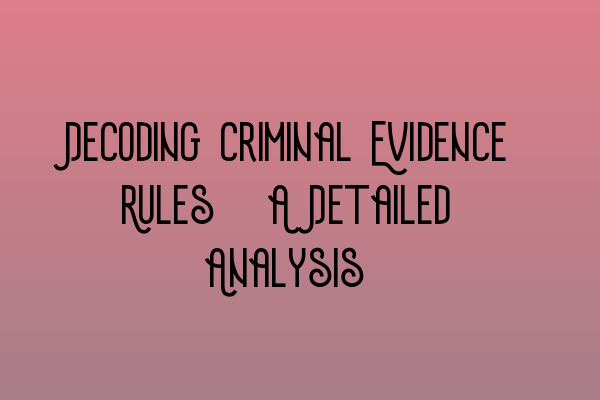Decoding Criminal Evidence Rules: A Detailed Analysis
Introduction:
Welcome to our comprehensive guide on understanding the intricacies of criminal evidence rules in the UK. As criminal defense solicitors at SQE Criminal Law & Practice Law UK, we are committed to providing you with the knowledge and insights you need to navigate the criminal justice system effectively. In this blog post, we will delve deep into criminal evidence rules, unravel their complexities, and provide you with a detailed analysis that will equip you with a solid foundation in this crucial area of law.
Understanding the Basics:
In any criminal trial, the admissibility and weight of evidence play a vital role. Criminal evidence rules serve as the framework for determining what evidence can be presented in court and how it should be evaluated. These rules aim to ensure fairness, protect the rights of the defendant, and maintain the integrity of the legal process. By grasping the key concepts and principles governing criminal evidence, you can better comprehend the reasoning behind the rules and effectively advocate for your clients.
Key Terms:
To provide you with a thorough understanding of criminal evidence, let’s familiarize ourselves with some key terms:
1. Admissibility: The determination of whether evidence is allowed to be presented to the court during trial.
2. Hearsay: Statements made by a person other than the testifying witness, offered to prove the truth of the matter asserted. Hearsay evidence is typically excluded unless it falls within an exception.
3. Best Evidence Rule: The requirement to present the original or highest-quality evidence available to prove a fact, whenever possible.
4. Burden of Proof: The responsibility of the prosecution to prove the guilt of the defendant beyond a reasonable doubt.
5. Relevance: The requirement for evidence to have a reasonable tendency to prove or disprove a fact in issue.
6. Privilege: Certain confidential communications, such as those between lawyers and clients, that are protected from disclosure.
7. Character Evidence: Evidence relating to a person’s disposition or propensity to behave in a particular way. Character evidence is generally inadmissible unless it becomes relevant to the issues raised in the case.
Types of Evidence:
Criminal evidence can take various forms, each with its own specific rules and considerations. Here are some key types of evidence commonly encountered in criminal trials:
1. Direct Evidence: Evidence that directly proves a fact without any inference or presumption. Examples include eyewitness testimony or surveillance footage.
2. Circumstantial Evidence: Indirect evidence that requires logical reasoning and inference to establish a fact. This type of evidence can be just as powerful as direct evidence but must be carefully evaluated.
3. Documentary Evidence: Written or recorded materials, such as contracts, emails, or medical records, that can provide crucial information in a criminal case. Proper authentication and foundation are necessary for the admission of documentary evidence.
4. Expert Evidence: Opinion or scientific evidence provided by professionals who possess specialized knowledge, such as forensic analysts or medical experts. Expert evidence must meet certain reliability and relevance criteria to be admissible.
5. Hearsay Evidence: As mentioned earlier, hearsay evidence involves statements made by someone other than the witness testifying in court. Exceptions to the hearsay rule exist, but it is generally excluded due to concerns about reliability and unfairness.
Challenging Evidence:
In criminal cases, it is essential to be able to challenge the admissibility, credibility, and weight of evidence presented by the prosecution. Understanding the grounds for challenging evidence can be instrumental in building a strong defense. Here are a few common grounds for challenging evidence:
1. Improper Seizure: Evidence obtained through an unlawful search and seizure may be excluded as a violation of the defendant’s rights protected under the Fourth Amendment.
2. Lack of Relevance: Evidence that does not have a reasonable connection to a fact in issue may be deemed irrelevant and inadmissible.
3. Unreliable Expert Evidence: Expert witness opinions must meet certain reliability standards established by the court. Challenging the methodology or qualifications of an expert can undermine their credibility.
Conclusion:
Decoding criminal evidence rules is a crucial step towards becoming a successful criminal defense solicitor. By understanding the basics, key terms, types of evidence, and grounds for challenging evidence, you can effectively navigate the complexities of the criminal justice system. However, it is essential to remember that this blog post serves only as a starting point, and further research and guidance from experienced professionals are necessary to master this intricate area of law.
At SQE Criminal Law & Practice Law UK, we are here to support you in your journey towards excellence in criminal law practice. Contact us today to learn more about our services and how we can assist you in your legal endeavors.
